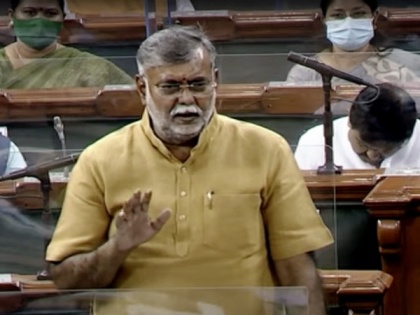Centre denies getting any request to conduct research on use of Ganga water in COVID treatment
By ANI | Published: December 22, 2022 05:38 PM2022-12-22T17:38:15+5:302022-12-22T23:10:07+5:30
The Central government on Thursday clarified that it has not received any request from National Mission for Clean Ganga ...

Centre denies getting any request to conduct research on use of Ganga water in COVID treatment
The Central government on Thursday clarified that it has not received any request from National Mission for Clean Ganga to conduct research on the use of Ganga river water as a cure for the COVID-19 virus.
According to the Ministry of Jal Shakti, in a written reply in Lok Sabha today, Minister of State for Jal Shakti Prahlad Singh Patel said, "Government has not received any request from National Mission for Clean Ganga (NMCG) to conduct research on the use of Ganga river water as a cure to the Covid-19 virus."
"However, NMCG had sent two proposals viz., 'Ganga Sediments could immunize against COVID-19' and 'Treatment of COVID-19 by Ganga Jal' on April 28, 2020, to the Indian Council of Medical Research for examination at their end," the Ministry said in a statement.
The Ministry said that the Central Pollution Control Board (CPCB) has informed that based on water quality monitoring of river Ganga being carried out during the Covid-19 period and studies conducted by them, State Pollution Control Boards (SPCBs) and other agencies to assess the impact of lockdown on the water quality of river Ganga and its tributaries, it has been observed that no definite trend exists in different water quality parameters observed for various stretches of river Ganga and its tributaries.
"However, varying degrees of improvement in a few water quality parameters have been observed as per CPCB and SPCB reports which may be attributed to various factors such as increased availability of fresh water due to rainfall in the river catchment, no industrial effluent discharge and reduced human activity such as restriction on bathing, ritual disposal, restricted tourism, solid waste, mass washing of clothes etc during the lockdown period," it said.
During the lockdown, it was ensured that all the sewage treatment plants (STPs) continue to function without any interruption. Guidelines were issued to follow all safety precautions while continuing the operation of STPs.
The various interventions for the abatement of pollution of rivers have been continued.
"Financial assistance is being provided to States for setting up of sewage infrastructure and other pollution abatement activities under Namami Gange and National River Conservation Plan (NRCP) of Ministry of Jal Shakti as well as AMRUT & Smart Cities Mission of Ministry of Housing and Urban Affairs."
It further said that the state governments have formulated river action plans to restore the water quality of polluted river stretches for intercepting, diverting and treatment of municipal wastewater from urban centres.
"Regulation of Industrial Pollution is implemented through various provisions of Water (Prevention and Control of Pollution) Act, 1974 under Consent mechanism by the respective State Pollution Control Board (SPCB) and Pollution Control Committees (PCC)," it said.
Online Continuous Effluent Monitoring Systems (OCEMS) are installed by 17- categories of industries and Grossly Polluting Industries (GPIs) being established on industrial units in the country through the directives issued by CPCB for getting real-time information on the effluent quality and non-complying units were identified and actions were taken against these units," it added.
( With inputs from ANI )
Disclaimer: This post has been auto-published from an agency feed without any modifications to the text and has not been reviewed by an editor
Open in app